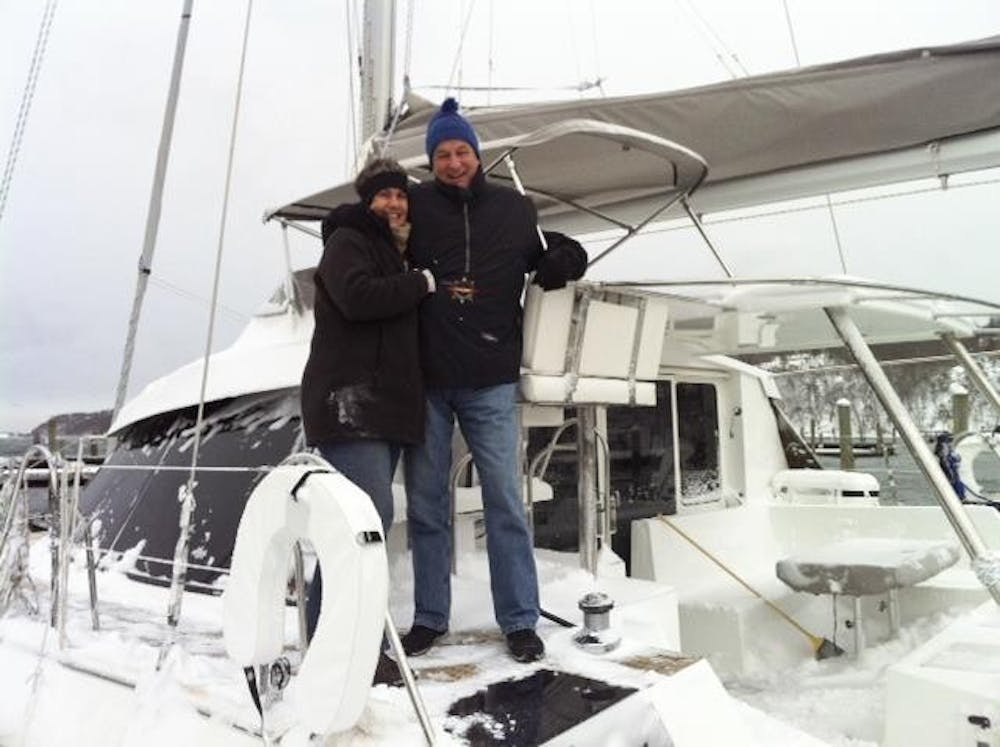They left the harbor Jan. 8.
After three days of good sailing, a storm swept around the boat of Gunther and Doris Rodatz.
Waves up to 14 feet rocked their 42-foot-long, 24-foot-wide catamaran sailboat, but the couple refused to panic.
The calm weather following this storm didn’t last long.
Soon another storm, worse than the first, threatened to overturn the craft.
The waves were 20 feet high and continued to grow.
It was during the second storm that a rogue wave hit.
Exceptionally tall, and considered a threat even to ocean liners and large ships, this rogue wave submerged the Rodatz’s boat in water.
It was the first time during their trip Doris felt truly afraid.
“In that moment, I thought the boat would crash,” she said.
Bloomington residents Gunther and Doris Rodatz were trapped at sea for four days because of these storms.
Sailing since the 1950s, Gunther said he was more than prepared to face the storms.
The couple had planned to sail from New Jersey to St. John in the United States Virgin Islands, and had left the harbor expecting good sailing weather.
But by the third day at sea, Gunther realized bad weather was on its way.
By this point, the boat’s generator, rudders and one engine had broken down, leaving the couple without electricity.
After realizing the full extent of the damage done to their boat, Gunther spent two days trying to fix the rudders and make the vessel safe to sail again.
During these two days, he did not contact the Coast Guard via the boat’s satellite telephone.
“We wanted to fix the problem ourselves,” he said. “But it turned out to be impossible.”
Once they knew it was useless to continue working on the boat, the couple called the Coast Guard seeking help.
The Coast Guard told them another winter storm was on its way and that the couple had to be rescued immediately.
“We weren’t given any choice to stay at sea,” Gunther said. “The Coast Guard insisted that we be taken back to land.”
Because the Rodatzes had no way to call anyone on land, their family in Germany had no idea what was happening to them and found out about the ordeal only after they were safely back on land.
“I have been emailing with my family, and they have read all the reports on our experience,” Doris said. “They would love to see us soon and were very worried about us.”
Having checked the weather forecast and gotten the all clear before leaving the harbor, Gunther said he was somewhat surprised at how soon the weather turned for the worse.
“We had a weather report that was very favorable, but this time of the year it can be so unpredictable,” he said.
The couple was relieved when the Coast Guard found them the morning of Jan. 13.
Doris said she felt relaxed when she was taken off the boat, because she knew she was safe and was being rescued.
“The U.S. Coast Guard and the Navy are heroes,” Gunther said. “They were the ones who rescued us.”
Gunther said this was not his first encounter with bad weather.
He said he felt safe in the boat because he knew how sturdy it was.
“You’re sitting in your own little nutshell, and the waves and the wind are doing whatever they want with you,” he said.
Gunther said he is unsure where he will sail to next with his wife, but he definitely plans on sailing again.
First, though, the couple will have to invest in a new boat.
When they were rescued, they had to leave the boat adrift in the ocean.
The Coast Guard sent out a search plane to look for their vessel, but were unable to locate it.
Gunther said whenever he’s faced with bad weather when sailing, all his energy goes into concentrating on the problem at hand.
For new sailors facing rough weather for the first time, he cautions them to be careful.
“You are encountering Mother Nature in the best kind of beauty,” he said. “It’s rough, but it has beauty, too. Just seeing what the environment can do is unbelievable.”
Lost at sea

Get stories like this in your inbox
Subscribe





